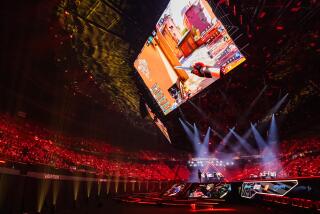Entrepreneur inspired by video game competition is launching Global Poker League
- Share via
Hordes of screaming fans are turning up at arenas or tuning in through apps to watch video game players duel each other. Now a veteran gambling entrepreneur is betting he can bring a huge, frenzied fandom to poker too.
This month, Alexandre Dreyfus is launching the Global Poker League, an ambitious 12-team organization designed to attract younger players to Texas Hold ‘Em. The 38-year-old hopes to reinvigorate a poker industry that he calls too static and too old, moving it beyond the serious, slow-paced World Series of Poker already popular on ESPN2.
His version is fast and aggressive, pitting teams of three players against each other. Timed matches at small studios in Burbank and Berlin will begin airing on the Web in March. Championships will stream from a huge venue this summer with — if all goes according to plan — a big paying audience cheering in person.
His inspiration is the booming competition scene for video games at events like BlizzCon, a massive two-day video game convention that draws tens of thousands of attendees from around the world to Anaheim.
“We need a product that converts the new generation to poker,” Dreyfus said. “If you had a choice between BlizzCon or a Las Vegas casino, you’re going to BlizzCon. The status quo must change.”
Casino executives, players and gambling industry analysts worry that he’s overestimating interest. Poker’s card-flipping just doesn’t captivate like football’s physical combat and lacks the frenetic action found in video games.
But they concede that the industry needs fresh ideas after a devastating 2011 crackdown by federal authorities who, enforcing anti-gambling laws, shut down leading poker websites.
At the time, casinos rejoiced because they assumed that the lack of online options would bring people into their poker rooms. But the online sites like PokerStars, Full Tilt Poker and Absolute Poker gave poker huge exposure. Annual poker revenue since 2010 has slid 15% in Nevada and more than 45% in New Jersey, according to the American Gaming Assn.
Just 13% of poker aficionados became “fans” over the last three years, according to a study Dreyfus commissioned.
Poker also isn’t growing on TV. ESPN has struggled to broaden the audience for the World Series of Poker, its weeks-long broadcast of the world’s most well-known poker tournament. Ratings for the event’s finale have remained at about 1.2 million viewers each of the last three years, according to Nielsen, despite changes to airtimes, broadcast lengths and editing strategies.
Ty Stewart, executive director of the World Series of Poker, said he’s “rooting for new companies” to help grow poker.
“This is clearly ambitious and innovative,” he said of Dreyfus’ plans, “and we hope [he] and his team get the runway required to build something that can sustain long-term.”
Dreyfus’ Global Poker League is backed by about $5 million from Chinese venture capitalists, poker players and media executives. But eventually he must make money off fans, with a goal of $300 million in media, merchandise and ticketing revenue by about 2020.
Key to his plan is avoiding the quiet, contemplative poker that TV viewers are used to.
Global Poker League matches won’t feature tables of individual players, but rather two three-player teams, plus two alternates on each bench. The game will involve one deck and three simultaneous duels, though Dreyfus won’t reveal more yet.
He plans to impose a chess-like clock, limiting the time that teams have to make moves. Games should be four times faster, Dreyfus claims.
Players will stand at a table to encourage them to release rage and excitement, with cameras capturing chest bumps and high fives.
With online gambling still illegal across most of the U.S., Dreyfus scrapped a poker tenet: gambling. Players won’t be staking their own money. Instead, they’ll earn side cash (at least to start): $100 an hour, an even-split of 30% of league revenue and a $20,000 championship bonus.
Sports, financial and media executives, and former poker players are managing the league-owned teams, including the Los Angeles Sunset, Las Vegas Moneymakers and Hong Kong Dragons. At the SLS Hotel in Beverly Hills on Feb. 25, they’ll draft players from a list including poker heavyweights Darren Elias, Chris Moorman and Anthony Zinno.
The plan is to attract thousands of spectators to playoffs at a New York City venue. That’s where a soundproof, 400-square-foot cube comes in.
The cube — similar to the glass boxes used for racquetball courts — allows events to be staged on arena floors. Players feel the energy during breaks as lights shine on the audience and audio gets pumped in.
Based out of Malta, Dreyfus is a longtime entrepreneur, founding technology and sports start-ups. He barely plays poker but saw an opportunity three years ago to mint poker fans. He bought Global Poker Index, a website that tracks tournaments and ranks players. The index helped Dreyfus forge industry relationships, serving as a launchpad for his league.
His research found that a quarter of the U.S. population likes poker, and of those tens of millions of people, 81% like watching it. About 59% of poker fans said they would watch his league on TV.
Other poker competitions haven’t had luck. The Epic Poker League, televised on CBS in 2011, accumulated more than $5 million in debt and went bankrupt the next year. Team-based Dream Team poker lasted a couple of years. And Fox Sports Net gave Poker Dome Challenge a year before shutting it down in 2006.
Despite those failures, players have signed on for the Global Poker League because they recognize that “for poker to grow they need to be a part of it,” Dreyfus said. Fans will follow if the show is exciting and has players worth rooting for, he said.
Growth of on-the-go video viewing on smartphones has opened doors for new forms of entertainment, including poker. Twitch, a video app known for videos of people playing games, now counts online poker player Jason Somerville as a top user. Thousands of his 16.5 million viewers last year signed up to play online poker for the first time.
Somerville said his early success shows that people still love poker, and he admires Dreyfus’ vision even if some “wacky” ideas might need adjusting.
Analysts also give Dreyfus a chance. Chris Grove, publisher of the OnlinePokerReport and senior consultant at advisory firm Eilers Research, said doubts five years ago about 17,000 people paying an average $99 to watch a video game competition have been proved wrong.
That’s good enough for him to “to entertain the possibility there might be the same interest for a variant of poker,” Grove said.
Twitter: @peard33
More to Read
Inside the business of entertainment
The Wide Shot brings you news, analysis and insights on everything from streaming wars to production — and what it all means for the future.
You may occasionally receive promotional content from the Los Angeles Times.











